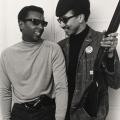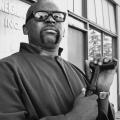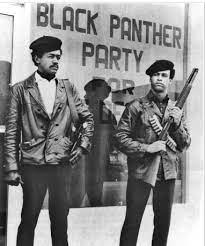110. Politics with Bloodshed: the Black Panthers
The philosophical underpinnings of a “vanguard of revolution” led by Huey P. Newton, Bobby Seale, and Eldridge Cleaver: the Black Panther Party.
Themes:
• E. Cleaver, Soul on Ice (New York: 1991, first ed. 1968).
• D. Hilliard and D. Weise (eds), The Huey P. Newton Reader (New York: 2002).
• B. Seale, Seize the Time: the Story of the Black Panther Party and Huey P. Newton (Baltimore: 1991, first ed. 1970).
---
• P. Alkebulan, Survival Pending Revolution: the History of the Black Panther Party (Tuscaloosa: 2007).
• J.L. Jeffries, On the Ground: the Black Panther Party in Communites Across America (Jackson MI: 2010).
• J. Bloom and W.E. Martin Jr, Black Against Empire: the History and Politics of the Black Panther Party (Berkeley: 2013).
• B.P. Powers, “The Socratic Black Panther: Reading Huey P. Newton Reading Plato,” Journal of African American Studies 21 (2017), 26-41.
• D.J. Murch, Living for the City: Migration, Education, and the Rise of the Black Panther Party in Oakland, California (Chapel Hill: 2010).






Comments
Fred Hampton
He was the highest development of Black Panther philosophy - Black leadership of a multinational coalition against capitalism - and was murdered for it by the state.
Philosophical works on the BPP
Some other further readings by philosophers that take the Black Panther Party and its members seriously as a philosophical organization and as philosophers:
- Huey P. Newton: The Radical Theorist by Judson Jeffries analyzes Newton as a political philosopher
- "Huey Newton’s Lessons for the Academic Left" and "I Am We: Dialectics of Political Will in Huey P. Newton and the Black Panther Party" by Jim Vernon
- I haven't read it, but Common Ground: A Comparison of the Ideas of Consciousness in the Writings of Howard Thurman and Huey Newton by Anthony Sean Neal seems interesting.
- The Man-Not by Tommy Curry draws on several of the Panthers for his analysis of Black males and their 'genred' oppression. Chapter 2 draws on Cleaver's Soul on Ice and his unpublished Book of Lives to analyze the racial-sexual fear of Black males. Chapter 3 draws on Elaine Brown's The Condemnation of Little B to analyze the super-predator myth of Black males and the antiblackness of the Black intellectual class. Chapter 5 draws on Newton substantially, such as his concept of 'revolutionary suicide' to discuss the Black male's lack of 'futurity' and his enduring social and literal death
- Curry also has (so far) published the only philosophy paper on Robert F. Williams, "Robert F. Williams and Militant Civil Rights: The Legacy and Philosophy of Pre-emptive Self-Defense". I found this paper especially helpful for understanding Black armed self-defense and armed-resistance as an intellectual and philosophical tradition
In reply to Philosophical works on the BPP by BPP Philosopher
Thanks very much for highlighting these
Such an important topic.
Add new comment